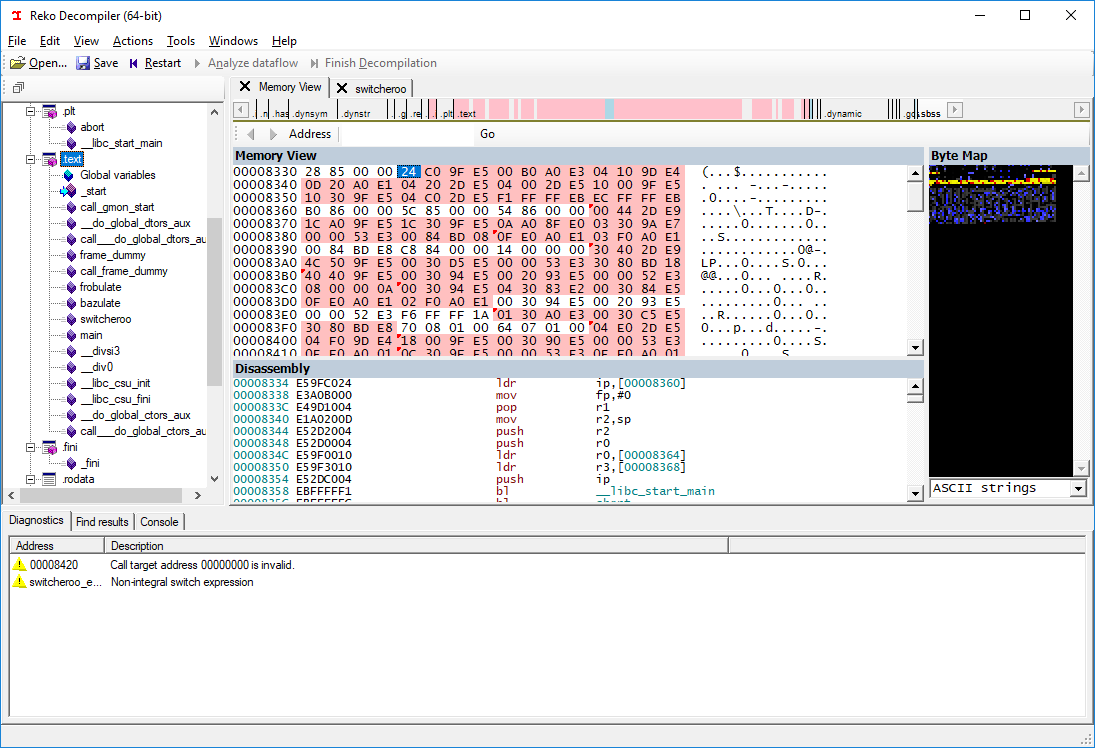- Joined
- Jan 8, 2019
- Messages
- 56,623
- Solutions
- 2
- Reputation
- 32
- Reaction score
- 100,456
- Points
- 2,313
- Credits
- 32,750
6 Years of Service
76%

Reko (Swedish: “decent, obliging”) is a C# project containing a decompiler for machine code binaries. This project is freely available under the GNU General Public License.
The project consists of front ends, the core decompiler engine, and back ends to help it achieve its goals. A command-line, a Windows GUI, and an ASP.NET front end exist at the time of writing. The decompiler engine receives inputs from the front ends in the form of either individual executable files or decompiler project files. Reko project files contain additional information about a binary file, helpful to the decompilation process or for formatting the output. The decompiler engine then proceeds to analyze the input binary.
Reko has the ambition of supporting decompilation of various processor architectures and executable file formats with minimal user intervention.
Reko consists of a central .NET assembly Reko.Decompiler.dll which contains the central core logic. Leaving aside the user interface for a moment, the Reko can at a glance be considered a pipeline. The first stage of the pipeline loads the executable we wish to decompile. Later stages perform different kinds of analyses, extracting information from the machine language where they can and aggregating it into structured information (such as Procedures and data types). The final stage is the output stage, where the source code is emitted into files.
A central tenet is that Reko is extensible: wherever possible, we strive to avoid hard-coding knowledge about specific platforms, processors, or file formats in the core decompiler. Instead, such special knowledge is farmed out in separate assemblies. Examples:
Reko.Arch.X86.dll – provides support for disassembling Intel X86 binaries.
Reko.ImageLoaders.MzExe.dll – understands how to load MS-DOS executable files and all related formats
Reko.ImageLoaders.Elf.dll – understands the ELF executable file format.
Changelog v0.9.3
This is the last time Reko is released for .NET Framework and Mono. Future releases will be based on .NET Core and .NET 5
The release consists of minor feature enhancements and bug fixes.
Initial support for IA-64 and v850 support
Support for the MIL-STD-1750, XCore-200, CompactRisc, MCore and Hexagon architectures
Rewrite Reko’s MemoryArea abstraction to support non-byte-oriented archictectures (like Cray YMP and MIL-STD-1750)
As usual, more x86 rewriters (with thanks to @smx-smx)
Improved Sparc, zSeries, and Risc-V disassemblers
Fuse adjacent memory accesses
x86 and GUI support for specifying separate architecture models.
Unpacker script for Exepack 3.60 et al.
Loader for preprocessed C headers, making it possible to use such headers as metafiles in Reko projects (with thanks to @ptomin)
User-supplied labels (#987)
Register Values dialog (#950)
Support for the TekHex and LDM text file formats
Support for Unicos binary executables.
Support for PharLap DOS Extender executables (with thanks to @gbody)
To see this hidden content, you must like this content.